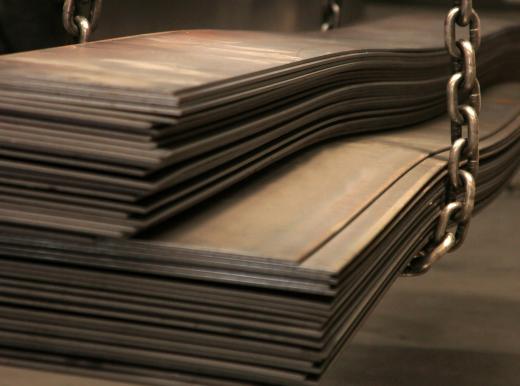A scoring tool is a piece of equipment which is designed to cut partway through a flat object, creating a deep groove. The object can be folded along the groove or it can be snapped, depending on what it is, creating two segments with neat edges. Many people use scoring tools on things which are supposed to be bent or folded, ensuring that the line of the fold is crisp and clean, and preventing potential damage to the rest of the object. Both art supply and hardware stores sell scoring tools which are designed for use on specific materials.
Typically, a scoring tool includes two parts: a guide, and a scorer. In some cases, a scoring tool is sold in the form of a standalone scorer, which should be used with a ruler or a similar guide for the best results. To use the scoring tool, someone sets up a guide along the line to be scored and then runs the scoring tool along it to create a groove. Even and precise pressure is required to ensure that the groove remains even; most scoring tools are blunt, so it is difficult to cut all the way through.

Once something has been scored, it can be folded along the score, if desired. To fold along the score, it is a good idea to use a folding tool, a burnished piece of material which will create a crisp fold without scuffing or otherwise damaging the material. In the field of paper arts, polished bone is the preferred material for folders, and many companies produce genuine bone folders. It is also possible to find “bone” folders made from plastic and other materials.

Scores can also be created in things like sheet metal, making it easier to fold the metal into shape. Scoring tools can also be used to cut glass, quartz, marble, and other minerals; typically the user creates a deep score and then gently taps the material to encourage it to snap in half. Scores are also built into things like chocolate bars and medications to allow people to break them into smaller, even pieces.

If you are working on a project which requires a scoring tool, make sure to get the right tool for the job. Scoring tools designed for metal, for example, are very different from those used for paper. If you are working on a paper project and you don't have access to a scoring tool, trying using a dead ballpoint pen and a ruler. Make sure that the pen has no ink left before you start, as it can leave marks otherwise. Simply hold the ruler down along the line you wish to score and then drag the pen firmly along the line of the ruler to create a groove.
Ever since she began contributing to the site several years ago, Mary has embraced the exciting challenge of being a About Mechanics researcher and writer. Mary has a liberal arts degree from Goddard College and spends her free time reading, cooking, and exploring the great outdoors.

